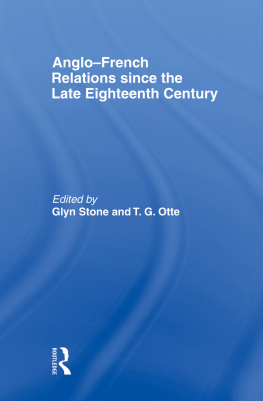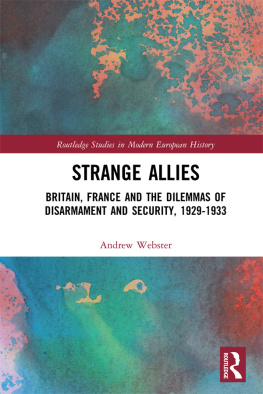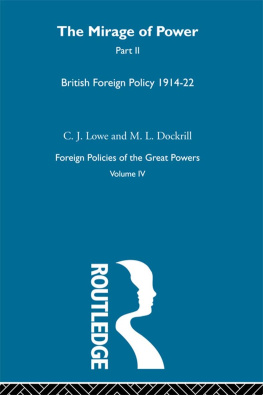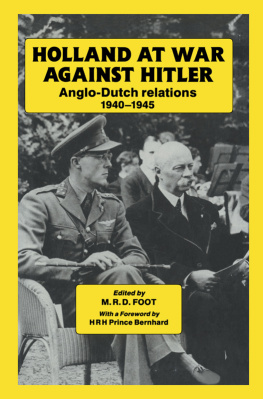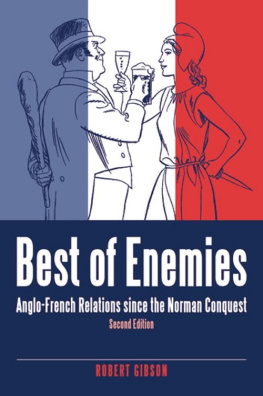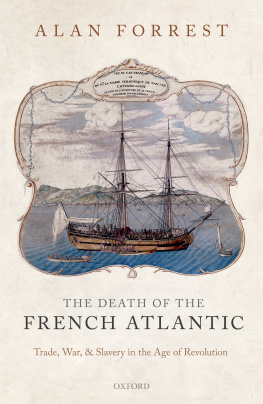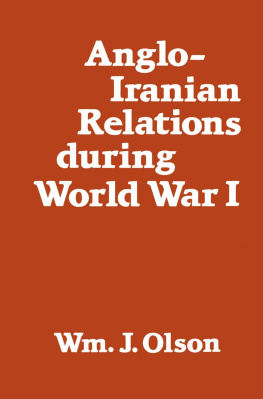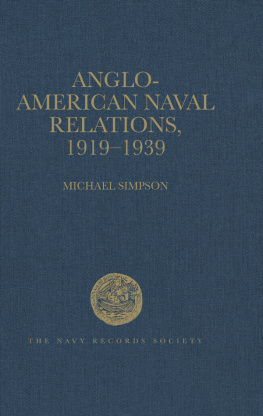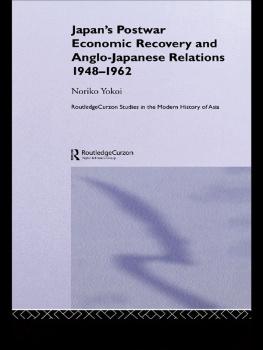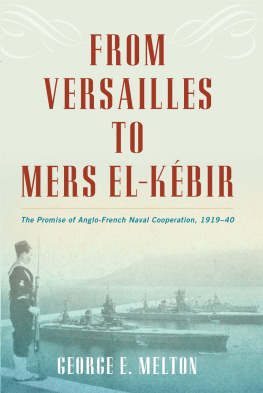ANGLOFRENCH RELATIONS SINCE THE LATE EIGHTEENTH CENTURY
This work, intended to commemorate the centenary of the Entente Cordiale in 2004, examines aspects of AngloFrench relations since the late eighteenth century, when both Britain and France were pre-eminent great powers at war with one another, through to the post-Second World War period when both had become rival second class powers in face of American and Soviet dominance. The chapters in this book examine and illuminate the nature of the AngloFrench relationship at certain periods during the last two hundred years, both in peacetime and in war, and include political, economic, diplomatic, military and strategic considerations and influences. While the impact of AngloFrench relations is centred essentially on the European context, other areas are also considered including the Middle East, Africa and the North Atlantic. The elements of conflict, rivalry and cooperation in AngloFrench relations are also highlighted whether in peace or war.
This book was previously published as a special issue of Diplomacy and Statecraft.
Glyn Stone is Professor of International History at The University of the West of England, Bristol.
T. G. Otte is Senior Lecturer in Diplomatic History at the University of East Anglia.
ANGLOFRENCH RELATIONS SINCE THE LATE EIGHTEENTH CENTURY
Edited by Glyn Stone and T. G. Otte
First published 2008
by Routledge
2 Park Square, Milton Park, Abingdon, Oxon, OX14 4RN
Simultaneously published in the USA and Canada
by Routledge
270 Madison Avenue, New York, NY 10016
Routledge is an imprint of the Taylor & Francis Group, an informa business
Transferred to Digital Printing 2009
2008 Glyn Stone and T. G. Otte
Typeset in Times by RefineCatch Ltd, Bungay, Suffolk NR35 1EF
All rights reserved. No part of this book may be reprinted or reproduced or utilized in any form or by any electronic, mechanical, or other means, now known or hereafter invented, including photocopying and recording, or in any information storage or retrieval system, without permission in writing from the publishers.
British Library Cataloguing in Publication Data
A catalogue record for this book is available from the British Library
Library of Congress Cataloguing in Publication Data
A catalog record has been requested
ISBN 10: 0-415-39578-X (hbk)
ISBN 10: 0-415-49500-8 (pbk)
ISBN 13: 978-0-415-39578-6 (hbk)
ISBN 13: 978-0-415-49500-4 (pbk)
Publishers Note
The publisher has gone to great lengths to ensure the quality of this reprint but points out that some imperfections in the original may be apparent.
CONTENTS
PHILIP BELL
ALAN SKED
JOHN CHARMLEY
DAVID BROWN
T. G. OTTE
DAVID R. WATSON
WILLIAM PHILPOTT
GAYNOR JOHNSON
MARTIN THOMAS
GLYN STONE
CHRISTOPHER BAXTER
ANNE DEIGHTON
JAMES ELLISON
KEITH HAMILTON
INTRODUCTION: THE ENTENTE CORDIALE AND THE SEA SERPENT
Philip Bell
This was originally delivered as the keynote lecture at the Entente Centenary Conference in June 2004.
Serge Sazonov, the Russian foreign minister before the Great War, once said of the Triple Entente between Britain, France and Russia that its existence was no better authenticated than that of a sea serpent. In this centenary year, I am tempted to transfer this remark to the Entente Cordiale. Sightings of this creature are frequently reported. Photographs show Queen Elizabeth II in conversation with President Jacques Chirac. Prime Minister Tony Blair has addressed President Chirac on TV as Jacques, which sounds terribly cordial. The royal Mint has struck coins bearing the inscription Entente Cordiale 19042004, and depicting a strange double-headed figure made up of Britannia and Marianne. And yet a nagging doubt persists: is there really solid evidence that the Entente Cordiale exists?
In one respect we must accept at once that the existence of the Entente is indeed better authenticated than that of the sea serpent. In this very building (The National Archives) we can hold in our hands certain documents signed on 8 April 1904: a convention respecting Newfoundland and West and Central Africa; a declaration respecting Egypt and Morocco; secret articles attached to this declaration; and a declaration concerning Siam, Madagascar and the New Hebridesthis last document being firmly hand-written in a good round script. These documents embodied a number of colonial deals, reached according to the methods of the old diplomacy. The British were to have a free hand in Egypt, which they had occupied since 1882 but where they had been constantly harassed by French obstruction, and the French were to have a free hand in Morocco, which they intended to occupy at some stage in the future. The agreements also defined boundaries between French and British colonies in West Africa, allotted spheres of influence in Siam, agreed on a condominium in the New Hebrides, and settled disputes over fishing rights off Newfoundland. All these matters had been discussed in strict secrecy, and with little regard to the wishes of the peoples concerned, or of the existing rulers of Morocco, Egypt or Siam.
These agreements also marked a move in European politics. Foreign minister Thophile Delcass intended that they should lead on to an alliance with Britain, to strengthen the French position against Germany. The British did not intend to go down that road, and Lord Lansdowne was not prepared to incur the formal obligations of an alliance with France. But during the very next year, 1905, Lansdowne himself proposed close consultation with the French, directed against Germany. His successor as foreign secretary, Sir Edward Grey, made the entente with France the basis of his policy. Secret military staff conversations worked out detailed arrangements to send a British expeditionary force to France in the event of war with Germany, and naval talks agreed that the French fleet should hold the western Mediterranean while the Royal Navy concentrated on the North Sea. The possibility of war against Germany on the side of France was well in sight, though by no means certain.
The Entente was thus in its origins and early years a colonial deal and a combination against Germany. Of these two aspects not a shred remains. The British and French empires have vanished almost completely, and with them the imperial cast of mind which was still strong in 1904. The under secretary at the Foreign Office, introducing the debate on the AngloFrench agreement in the House of Commons spoke of the inevitable dissolution of ancient barbarisms when brought into contact with the march of Western civilisationwhich is not a sentiment we hear very often nowadays. The secret diplomacy which produced the agreements is also remembered with distaste, and was supposedly abandoned, as early as 1919, in favour of open covenants openly arrived at. (It is true that neither imperialism nor secret diplomacy has entirely vanished from the face of the earth, but we must let that pass.) The colonial deal between Britain and France is a thing of the past, and remembered only to be deplored.
As for Britain and France combining against Germany, such an association is now inconceivable. The boot is on the other foot. Under the terms of the FrancoGerman Treaty of Paris of 1963 the French and Germans hold summit meetings twice a year, and in practice meet more frequently than that. In April 1969 President Charles de Gaulle, in the month of his resignation, told Maurice Schumann, the one-time broadcaster for

